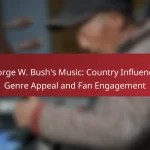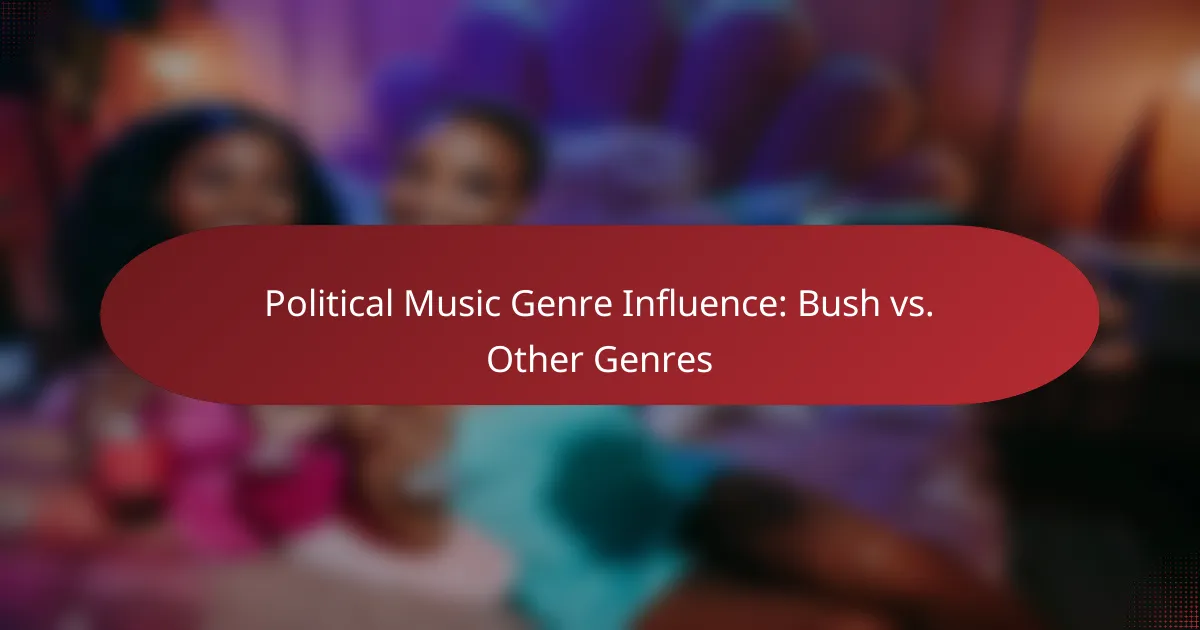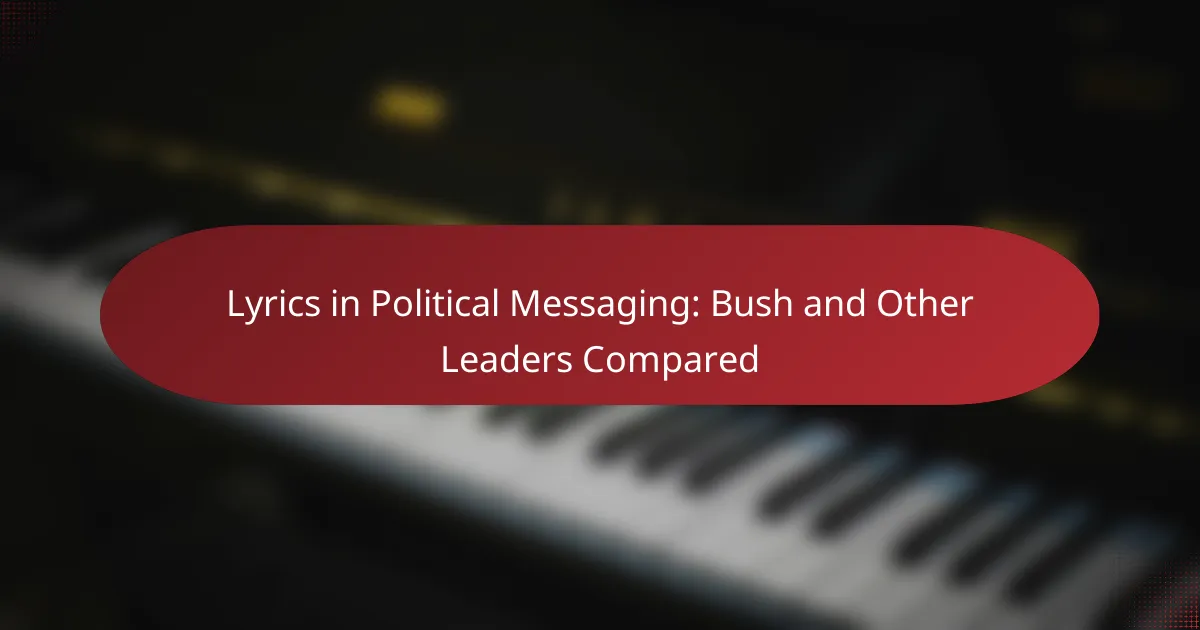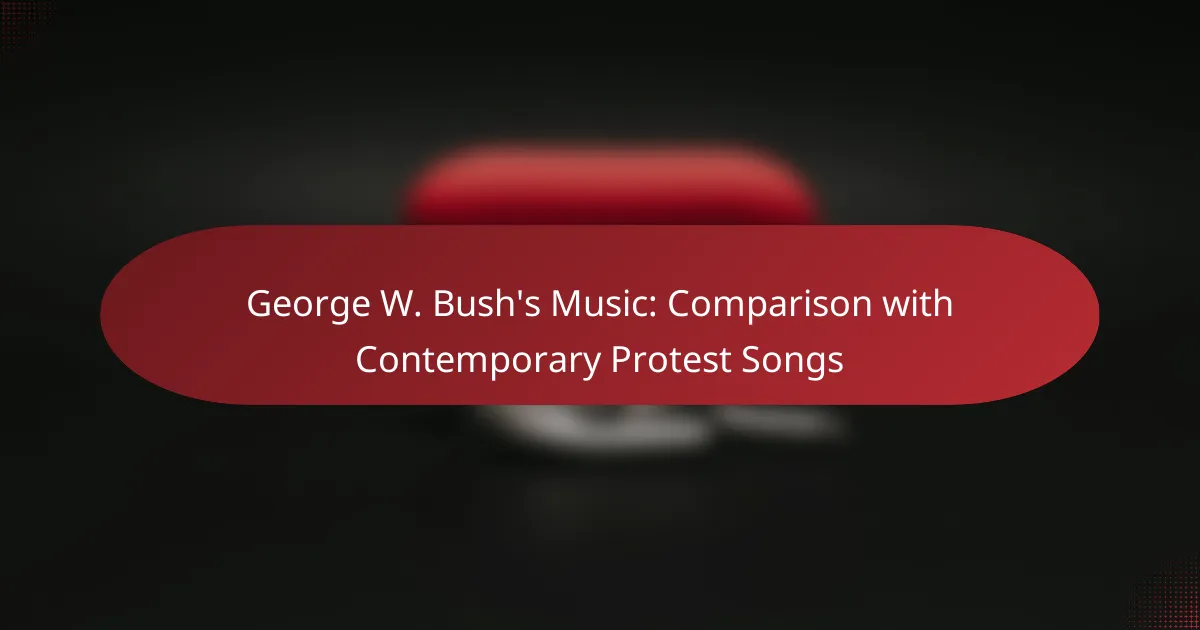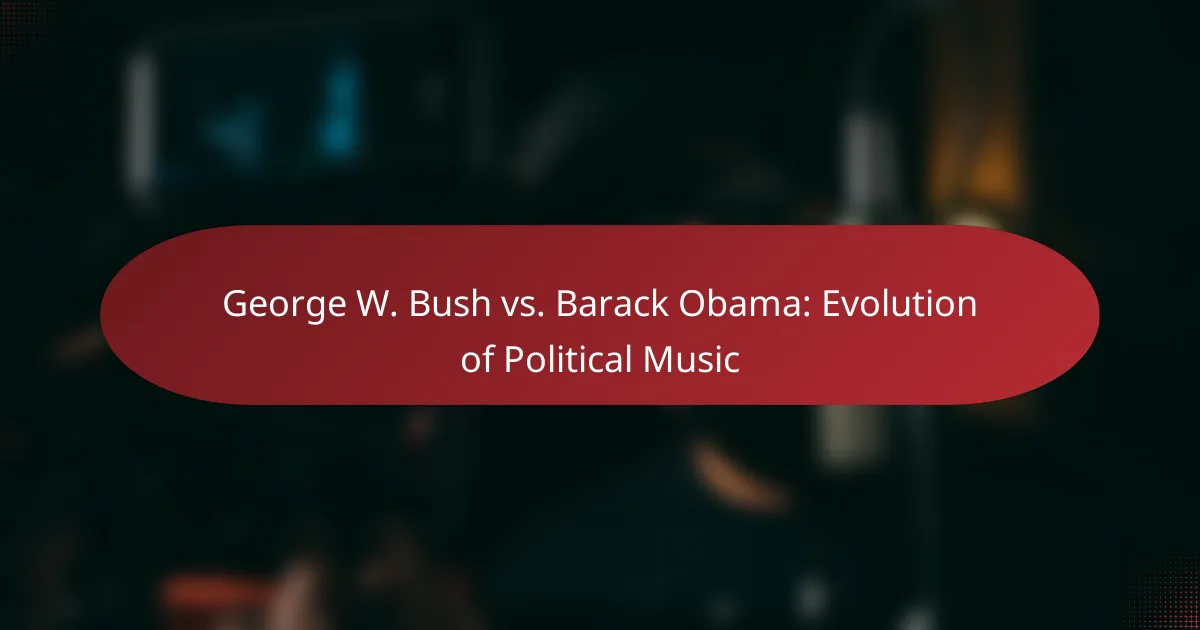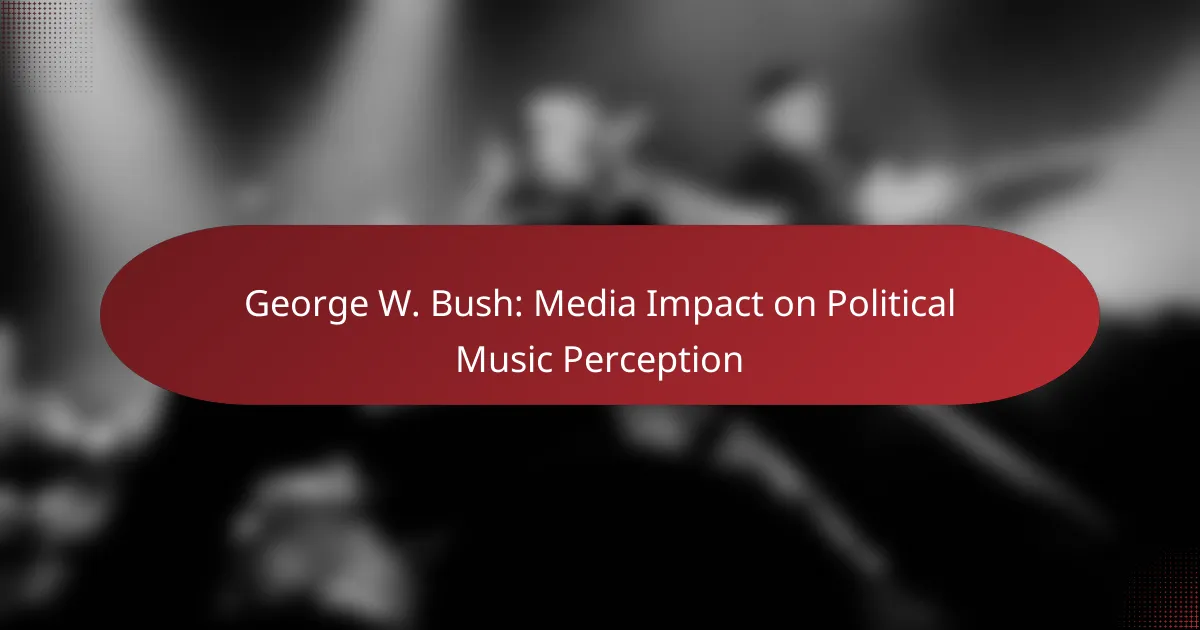Political music plays a crucial role in shaping public opinion in the United States by mirroring societal sentiments and galvanizing listeners around pressing issues. Bush’s political music stands out for its direct engagement with themes of war and social justice, utilizing a blend of rock and alternative sounds to convey critical perspectives on governance. This unique fusion of personal experience and broader social commentary distinguishes Bush’s work from other genres, appealing to audiences who seek both entertainment and meaningful insight.
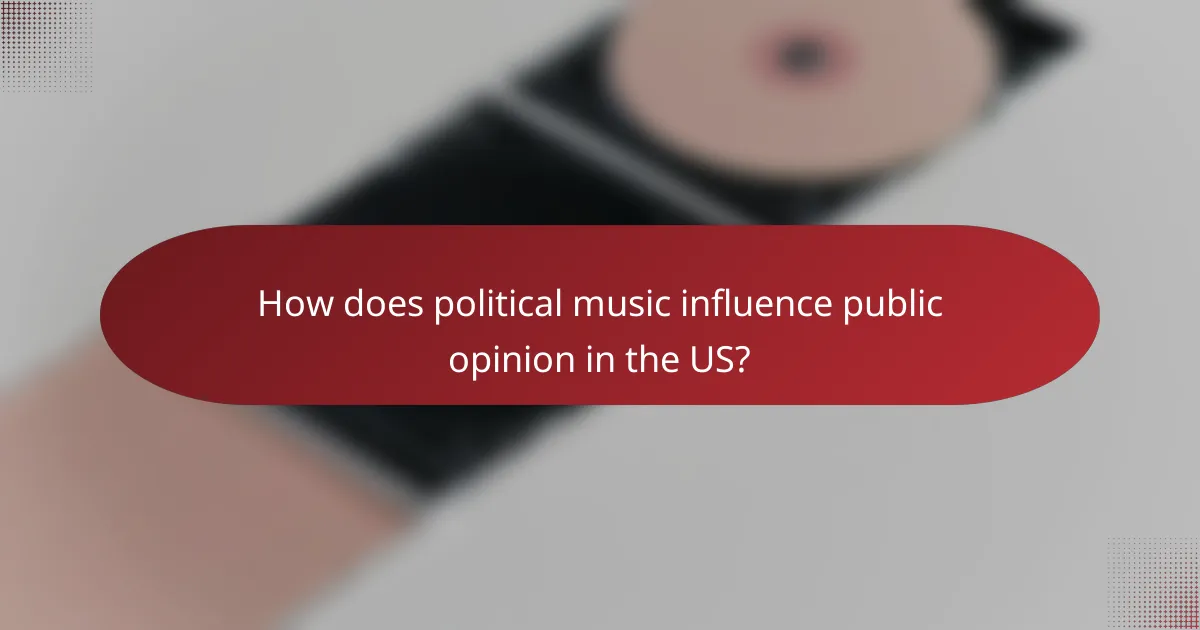
How does political music influence public opinion in the US?
Political music significantly shapes public opinion in the US by reflecting societal sentiments and mobilizing listeners around specific issues. Through lyrics and themes, artists can raise awareness, provoke thought, and inspire action among diverse audiences.
Impact of protest songs
Protest songs have historically played a crucial role in influencing public opinion by voicing dissent and rallying support for social movements. For example, songs from the civil rights era, such as “We Shall Overcome,” helped unify activists and spread their message widely.
These songs often resonate emotionally, making complex political issues more relatable. Their ability to capture the spirit of a movement can lead to increased engagement and participation in protests and advocacy efforts.
Role of social media
Social media amplifies the reach of political music, allowing artists to share their messages instantly with millions. Platforms like Twitter, Instagram, and TikTok enable songs to go viral, often sparking discussions and mobilizing listeners around particular causes.
Moreover, social media allows fans to engage directly with artists, creating a community around shared beliefs. This interaction can strengthen the impact of political music, as listeners feel a personal connection to the issues being addressed.
Case studies of influential artists
Artists like Bob Dylan and Kendrick Lamar exemplify how political music can shape public discourse. Dylan’s “The Times They Are a-Changin'” became an anthem for change during the 1960s, while Lamar’s “Alright” has served as a rallying cry for the Black Lives Matter movement.
These artists not only address pressing social issues in their lyrics but also engage with their audiences through live performances and social media, further enhancing their influence on public opinion. Their work demonstrates the power of music as a tool for political expression and social change.
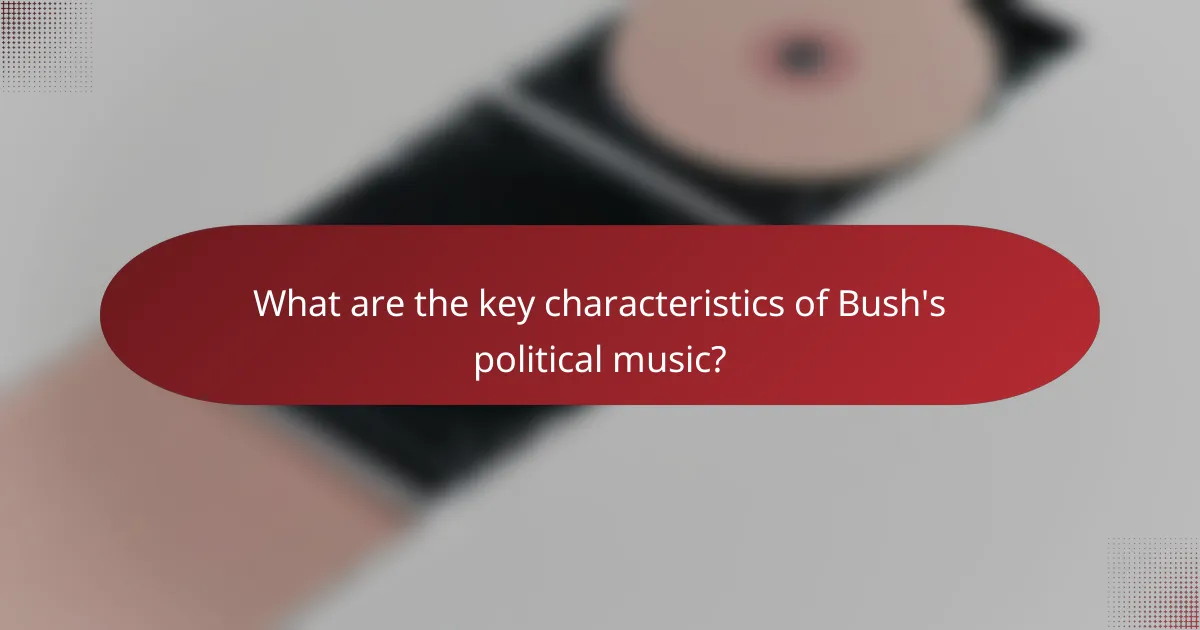
What are the key characteristics of Bush’s political music?
Bush’s political music is characterized by its direct engagement with themes of war, peace, and social issues, often delivered through a blend of rock and alternative sounds. The band’s lyrics frequently reflect a critical stance on political events, particularly those related to conflict and governance.
Lyrics focused on war and peace
The lyrics of Bush often tackle the complexities of war and peace, addressing the emotional and societal impacts of conflict. Songs like “The Chemicals Between Us” explore the psychological effects of warfare, while others critique political decisions that lead to military action.
This focus on war and peace resonates with listeners who seek music that reflects their concerns about global issues. The band’s ability to weave personal narratives with broader political themes creates a compelling commentary on the state of the world.
Use of satire and irony
Bush employs satire and irony to critique political figures and policies, making their music not just entertaining but also thought-provoking. This approach allows them to address serious topics while engaging listeners through clever wordplay and sharp commentary.
For example, songs that juxtapose upbeat melodies with dark or ironic lyrics highlight the contradictions in political rhetoric, prompting listeners to reflect on the disparity between promises and reality. This technique enhances the impact of their message, encouraging critical thinking about political issues.
Collaboration with other artists
Collaboration is a significant aspect of Bush’s political music, as they often work with other artists to amplify their message. These partnerships can bring diverse perspectives and styles, enriching the overall sound and thematic depth of their music.
Collaborations with artists from various genres can also help reach a wider audience, fostering discussions around political themes across different musical communities. This blending of influences not only enhances their sound but also reinforces the importance of unity in addressing social and political challenges.
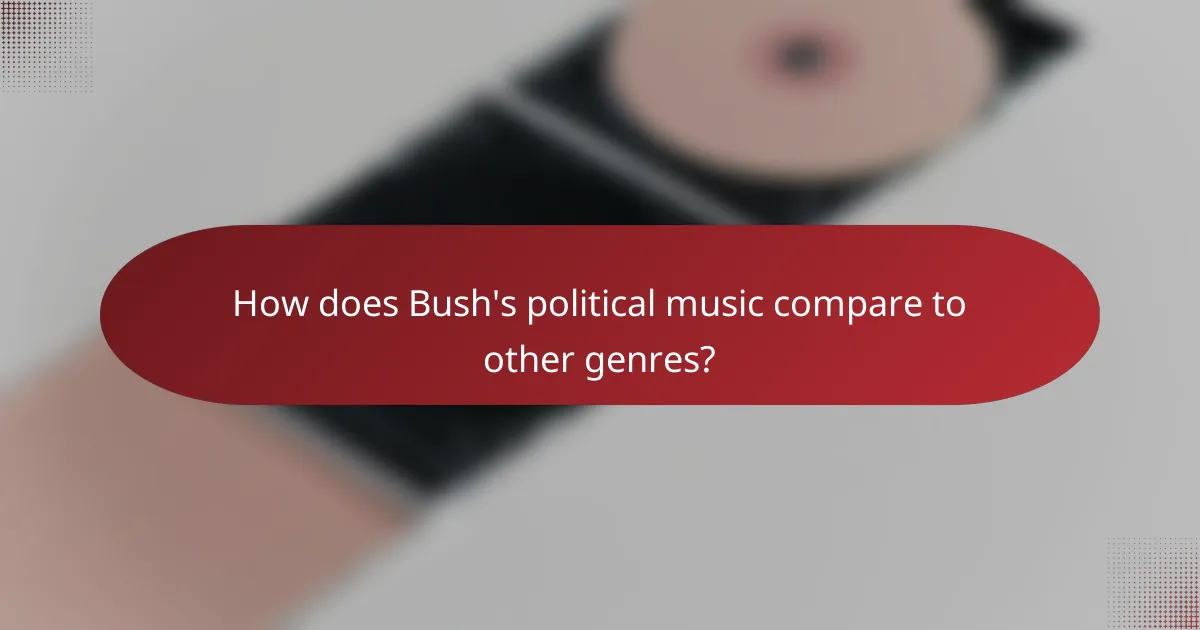
How does Bush’s political music compare to other genres?
Bush’s political music often blends personal experiences with broader social commentary, setting it apart from other genres. While many musical styles address political themes, Bush’s approach combines rock elements with a distinct narrative style that resonates with listeners seeking both entertainment and insight.
Differences with hip-hop political commentary
Bush’s political music differs from hip-hop in its delivery and thematic focus. While hip-hop often employs sharp, direct lyrics to critique societal issues, Bush tends to weave storytelling into his songs, creating a more reflective tone. This narrative style can sometimes dilute the immediacy found in hip-hop’s punchy verses.
Moreover, hip-hop frequently addresses systemic injustices and personal struggles in urban contexts, while Bush’s music may explore themes of personal growth and resilience within a broader socio-political landscape. This difference in focus can lead to varied audience receptions, with hip-hop often appealing to younger, urban listeners, while Bush may attract a more diverse demographic.
Comparison with folk music activism
Folk music activism shares a common ground with Bush’s political themes, as both often emphasize storytelling and personal connection to social issues. However, folk music typically relies on acoustic instrumentation and traditional melodies, creating a more intimate atmosphere. Bush’s rock-influenced sound adds a layer of energy that can engage listeners in different ways.
Additionally, folk music has a long history of protest and social commentary, often rooted in specific historical contexts. In contrast, Bush’s music may address contemporary issues with a more modern lens, appealing to listeners who appreciate a blend of nostalgia and current relevance.
Influence of punk rock on political discourse
Punk rock has significantly shaped political discourse in music, emphasizing rebellion and anti-establishment sentiments. Bush’s political music incorporates elements of punk’s raw energy and urgency, but often with a more polished sound that makes it accessible to a wider audience. This blend allows Bush to engage with political themes while maintaining mainstream appeal.
Furthermore, punk rock’s focus on direct action and activism contrasts with Bush’s more introspective approach. While punk songs may call for immediate change, Bush’s lyrics often encourage reflection and personal responsibility, inviting listeners to consider their roles in societal issues. This nuanced approach can foster deeper conversations about politics and personal agency among fans.
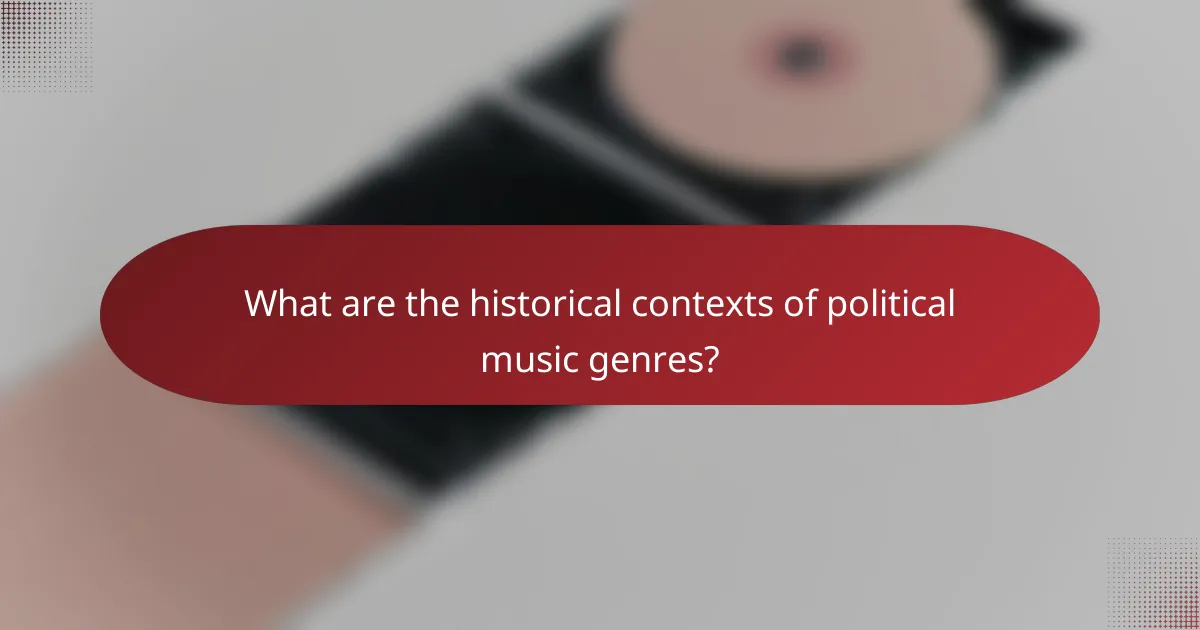
What are the historical contexts of political music genres?
Political music genres have evolved significantly over time, often reflecting the social and political climates of their eras. Key historical events, such as wars and civil rights movements, have shaped the themes and messages within these genres, influencing artists and audiences alike.
Evolution during the Vietnam War
The Vietnam War marked a pivotal moment for political music, with artists using their platforms to voice opposition to the conflict. Songs like “Fortunate Son” by Creedence Clearwater Revival captured the discontent of many Americans who felt the war disproportionately affected the working class.
This era saw the rise of folk and rock music as powerful tools for protest, with artists like Bob Dylan and Joan Baez leading the charge. Their music not only provided solace to those against the war but also galvanized public opinion, making political statements more mainstream.
Impact of the Civil Rights Movement
The Civil Rights Movement in the United States significantly influenced political music, with artists creating anthems that called for equality and justice. Songs such as “A Change is Gonna Come” by Sam Cooke became emblematic of the struggle for civil rights, resonating deeply with those fighting against racial discrimination.
This period saw a blend of genres, including gospel, blues, and folk, as musicians collaborated to amplify their messages. The music served as both a rallying cry and a means of healing, fostering a sense of unity among diverse communities advocating for change.
Trends in the 21st century
In the 21st century, political music has diversified, reflecting a wide array of global issues, including climate change, social justice, and political corruption. Artists like Beyoncé and Kendrick Lamar have used their music to address contemporary social issues, blending genres such as hip-hop and pop to reach broader audiences.
Digital platforms have transformed how political music is distributed and consumed, allowing for rapid dissemination of messages. Social media has enabled artists to engage directly with fans, creating movements around their music that can mobilize support for various causes almost instantaneously.
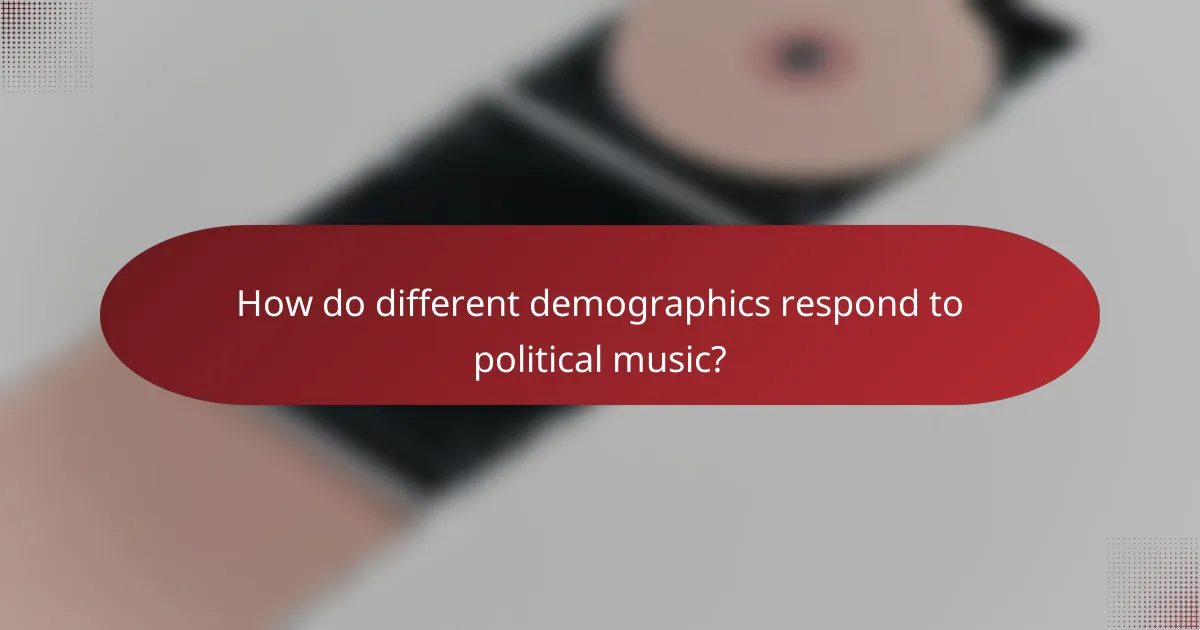
How do different demographics respond to political music?
Different demographics respond to political music in varied ways, influenced by factors such as age, region, and cultural background. Understanding these responses can help artists and listeners connect more effectively with their audiences.
Generational differences in music consumption
Generational differences significantly shape how individuals consume political music. Younger generations, such as Millennials and Gen Z, often prefer genres like hip-hop and pop that incorporate political messages, while older generations may lean towards classic rock or folk music that has historically addressed social issues.
Moreover, platforms play a role; younger listeners are more likely to discover political music through streaming services and social media, while older audiences might rely on traditional radio or physical media. This shift highlights the importance of adapting marketing strategies to target specific age groups effectively.
Regional variations in political music preferences
Regional variations greatly influence political music preferences, with certain genres resonating more in specific areas. For instance, country music often reflects the political sentiments of rural America, while urban areas may favor hip-hop or R&B, which frequently address social justice themes.
Additionally, local political climates can affect music trends. In regions with strong activist movements, artists may produce more politically charged content, while in areas with less political engagement, music may focus more on personal themes rather than broader societal issues.
Influence of cultural background
Cultural background plays a crucial role in shaping responses to political music. Different ethnic groups often have distinct musical traditions that reflect their historical and social experiences. For example, Latinx communities may gravitate towards genres like reggaeton or cumbia that incorporate political messages relevant to their experiences.
Furthermore, the intersection of culture and politics can lead to the emergence of unique musical styles that address specific issues faced by particular communities. Artists who draw from their cultural heritage can create powerful political statements that resonate deeply with their audiences, fostering a sense of identity and solidarity.
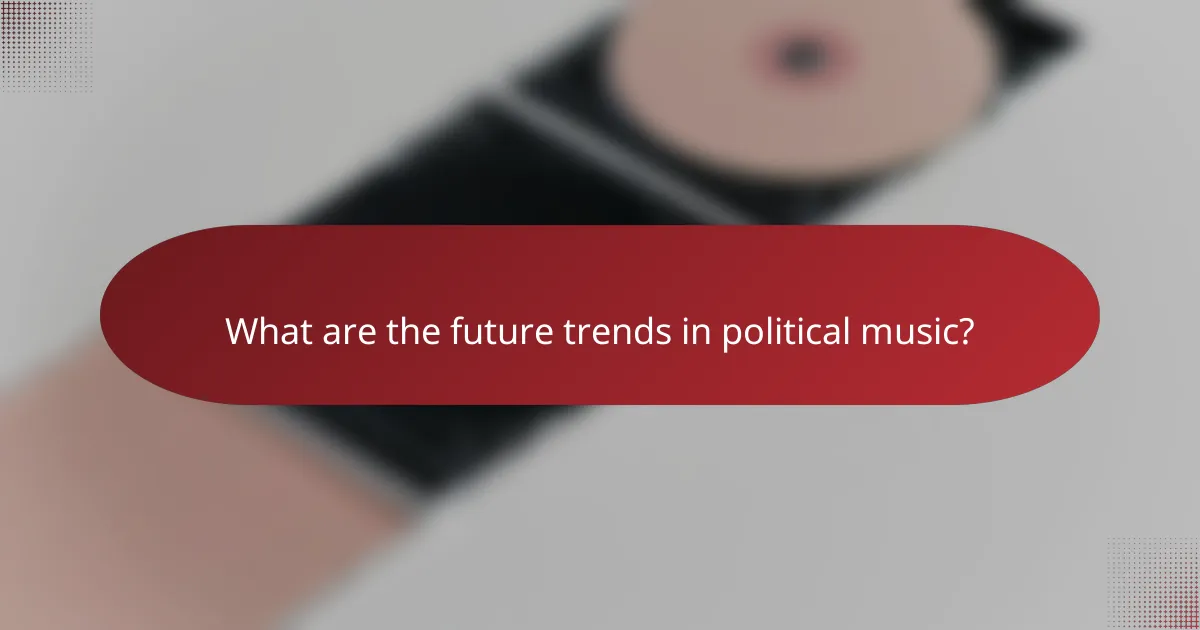
What are the future trends in political music?
The future of political music is likely to be shaped by the rise of digital platforms, advancements in technology, and the potential for global political movements. These trends will influence how artists create, distribute, and engage audiences with political messages.
Emergence of digital platforms
Digital platforms like Spotify, YouTube, and social media are transforming how political music reaches audiences. Artists can now share their work globally, bypassing traditional gatekeepers like record labels and radio stations.
This democratization allows for a diverse range of voices and perspectives, making it easier for grassroots movements to gain traction. As a result, political music can resonate more deeply with listeners who may feel marginalized by mainstream narratives.
Integration of technology in music production
Advancements in music production technology are enabling artists to create high-quality political music more efficiently. Software tools and affordable equipment allow musicians to experiment with sounds and styles that reflect their political messages.
For instance, the use of digital audio workstations (DAWs) and mobile recording apps can facilitate collaboration across distances, encouraging a blend of genres that can amplify political themes. This integration can lead to innovative sounds that attract a wider audience.
Potential for global political movements
Political music has the potential to unite global movements by addressing universal themes such as justice, inequality, and freedom. As artists from different countries collaborate, they can share their unique cultural perspectives while highlighting common struggles.
For example, songs that address climate change or human rights can resonate across borders, fostering solidarity among diverse groups. This global reach can enhance awareness and mobilize action on pressing issues, making political music a powerful tool for change.



